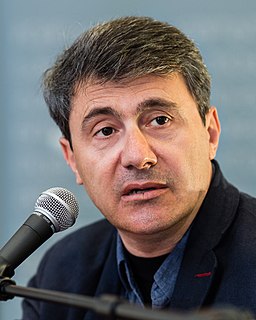 W
WPrince Kita (Ivane) Abashidze was a Georgian literary critic, journalist, and politician.
 W
WVasil Barnovi was a Georgian writer popular for his historical novels.
 W
WGiorgi Chubinashvili was a Georgian art historian.
 W
WGuram Dochanashvili is a Georgian prose writer, a historian by profession, who has been popular for his short stories since the 1970s.
 W
WValerian Gaprindashvili was a Georgian poet and translator whose early, Symbolist, poetry was of much influence on development of Georgian metaphor and verse.
 W
WMariam Garikhuli, official name Mariam Lukas Tatishvili-Ratiani, was a Georgian writer and actress. As an author, under the pseudonym Garikhuli, she contributed to magazines and newspapers, publishing her first short story "ცხოვრების მსხვერპლი" in 1905. Assisted by Lado Meskhishvili, she adapted works by Ilia Chavchavadze and Akaki Tsereteli for the theatre. In addition to contributing to various children's publications, she is remembered for her novel ანარეკლი (Reflection) written in the 1930s. As a actress, she performed at theatres in Kutaisi (1902–1904), Gori (1920–1926) and at the Tbilisi Film Studio (1927–1941).
 W
WNaira Gelashvili is a Georgian fiction writer, philologist, Germanist, and civil society activist.
 W
WMirza Gelovani was a Georgian poet who died, fighting in the Soviet ranks during World War II at the age of 27.
 W
WTerenti Kvirkvelia, well known with his pen-name Terenti Graneli (1897–1934) was a noted Georgian poet. Born in Tsalenjikha, he was raised in a family of poor peasants. After graduating primary school in his native village in 1918 he continued studying at the short courses organized by Shalva Nutsubidze in Tbilisi. He had several jobs including a worker at the railway station, and clerk at the newspaper. Graneli published his first verses in 1918. His collection of poems "Memento mori" appeared in 1924. From the beginning of 1928 Graneli's health worsened and he died in 1934.
 W
WIoseb Grishashvili was a pen name of Ioseb Mamulishvili was a noted poet and historian from Georgia. A history museum in Tbilisi, his birth- and death place is named for him.
 W
WDmitry Gulia was an Abkhazian Soviet writer and poet, considered to be one of the founders of Abkhaz literature.
 W
WIetim Gurji was a Georgian poet. He wrote in Georgian, Armenian and Azeri languages. His poetry mainly was distributed orally, by songs, which he created and performed himself. Main motifs of his poetry were the lives of late 19th and early 20th century Old Tbilisi bohemians, along with workers, peasants and petite bourgeoisie.
 W
WHilarion the Iberian was a Georgian monk from the Kakheti region, bishop of David Gareja. He was considered as the thaumaturgus and is venerated as a saint. His vita was composed after his death on Mount Athos by the followers of Euthymius of Athos. The extant texts are from 10th and 11th centuries. Per the vita, Hilarion visited the Holy Land and traveled with his followers through Palestine and Syria. He visited Mount Tabor, the Jordan River and the Lavra of Saint Sabas. Hilarion would stay there for seven years living in the cave leading monastic hermitage. Later, in 864, he founded a monastery on Mount Olympus, possibly identified as "Lavra of Krania", which was housing largely his Georgian compatriots. The church at various times sheltered John the Iberian, Euthymius of Athos and Tornike Eristavi. Hilarion died in Thessaloniki.
 W
WPlaton Ioseliani was a Georgian historian and civil servant in the Imperial Russian service.
 W
WAlexander Kazbegi (1848–1893) was a Georgian writer, famous for his 1883 novel The Patricide.
 W
WAleksandr Solomonovich Khakhanov born Aleksandre Khakhanashvili was a Georgian-Russian historian, archaeologist, and one of the most acclaimed scholars of Georgian literature.
 W
WBeka Kurkhuli - is a modern Georgian writer and military reporter.
 W
WPrince Ivane Machabeli was a Georgian writer, translator, publicist, public figure, active member of the National-Liberation Movement, and a founder of the new Georgian literary language. He is also well known for his resonant translations of Shakespeare and for writing the opera of "The Knight in the Panther's Skin."
 W
WTamta Melashvili is a Georgian writer and a feminist activist.
 W
WAka Morchiladze is the pen name of Giorgi Akhvlediani, a Georgian writer and literary historian who authored some of the best-selling prose of post-Soviet Georgian literary fiction. Morchiladze's work shows reorientation of the early 21st-century Georgian literature towards the Western influences.
 W
WEgnate Ninoshvili was a Georgian writer.
 W
WIoane Petritsi also referred as John Petritsi was a Georgian Neoplatonist philosopher of the 11th-12th century, active in the Byzantine Empire and Kingdom of Georgia, best known for his translations of Proclus, along with an extensive commentary. In later sources, he is also referred to as Ioane Chimchimeli. The Stanford Encyclopedia of Philosophy describes Petritsi as "the most significant Georgian medieval philosopher" and the "most widely read Georgian philosopher."
 W
WBagrat Uasyl-ipa Shinkuba was an Abkhaz writer, poet, historian, linguist and politician. He studied history and languages of Abkhaz, Adyghe and Ubykh people. His novel The Last of the Departed is dedicated to the tragic destiny of Ubykh nation, which became extinct along a hundred of years.
 W
WHis Illustrious Highness Prince Nicholas Tchkotoua (1909-1984) was a Georgian writer and a prominent member of the Order of Malta. He fled his homeland after the takeover by the Bolsheviks in 1921. He was educated in France and Switzerland and settled in the US in 1933 where he met and married Carol Marmon, only daughter of Howard Carpenter Marmon. He and his family later moved to Lausanne, Switzerland where he died in 1984.
 W
WAvksenty Tsagareli was a Georgian playwright particularly known for his comedies. He was described in the Great Soviet Encyclopedia as "one of the finest representatives of realistic drama."
 W
WDavid "Dato" Turashvili is a Georgian fiction writer.
 W
WTedo Zhordania was a Georgian historian, philologist, and educator.